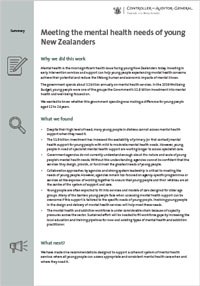Summary of our report
Why we did this work

The Government spends about $2 billion annually on mental health services. In the 2019 Wellbeing Budget, young people were one of the groups the Government’s $1.9 billion investment into mental health and well-being focused on.
We wanted to know whether this government spending was making a difference for young people aged 12 to 24 years.
What we found
- Despite their high level of need, many young people in distress cannot access mental health support when they need it.
- The $1.9 billion investment has increased the availability of primary (or first contact) mental health support for young people with mild to moderate mental health needs. However, young people in need of specialist mental health support are waiting longer to access specialist care.
- Government agencies do not currently understand enough about the nature and scale of young people’s mental health needs. Without this understanding, agencies cannot be confident that the services they design, provide, or fund meet the greatest needs of young people.
- Collaborative approaches by agencies and strong system leadership is critical to meeting the needs of young people. However, agencies remain too focused on agency-specific programmes or services at the expense of working together to ensure that young people and their whānau are at the centre of the system of support and care.
- Young people are often expected to fit into services and models of care designed for older age groups. Many of the barriers young people face when accessing mental health support can be overcome if this support is tailored to the specific needs of young people. Involving young people in the design and delivery of mental health services will help meet these needs.
- The mental health and addiction workforce is under considerable strain because of capacity pressures across the sector. Sustained effort will be needed to fill workforce gaps by increasing the local education and training pipelines for new and existing types of mental health and addiction practitioner.
What next?
We have made nine recommendations designed to support a coherent system of mental health services where all young people can access appropriate and consistent mental health care when and where they need it.

